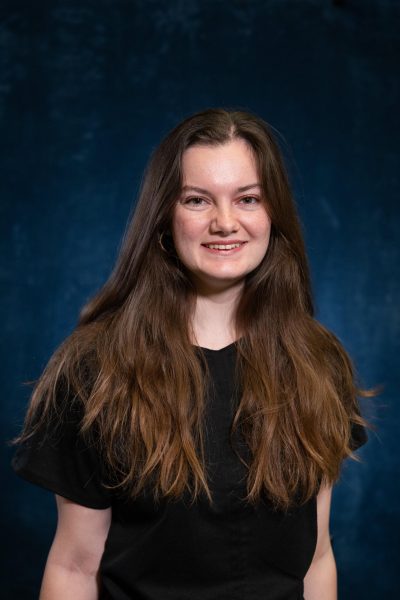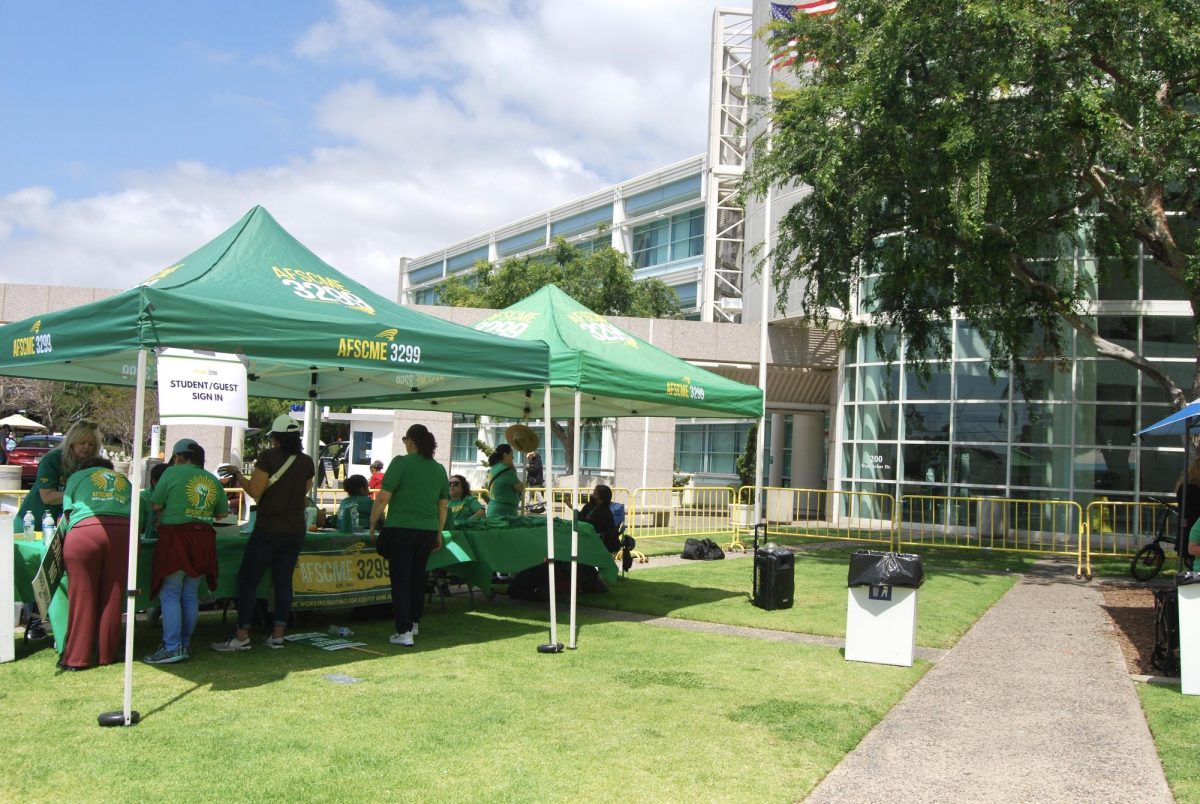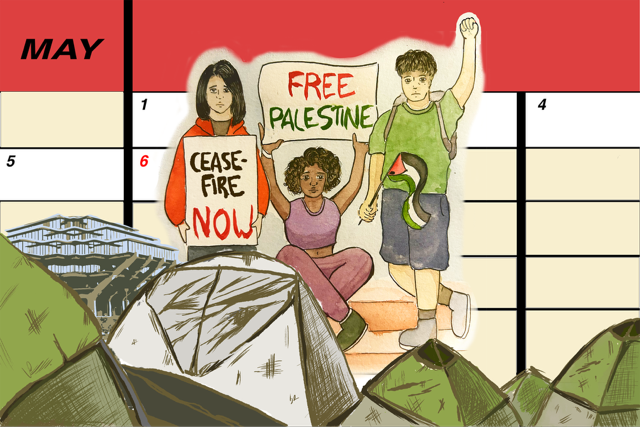How a Sorority Rushes for Complacency
Photo by Ava Bayley/ UCSD Guardian
May 7, 2023
The Greek sorority life on UC San Diego’s campus aims to be warm and welcoming, but for some girls it’s felt discriminatory and values words over action — a somber reflection of cliches on screen into reality.
Alongside Library Walk, during recruitment time, fellow students cheerfully flag down other girls with small fliers to encourage them to join their sororities. The gestures to potential newcomers are warm and welcoming, in place for every girl to try their luck in a game of deliberate selection for one of the 21 sororities on campus.
But the process itself is not idyllic for the hundreds of girls rushing to join each year. Behind the scenes, the process to get into a sorority is rigorous, costly, and competitive. Further, the longing to belong in a niche community exists in tandem with the awareness that much of the rushing process comes with rejection.
Because sororities focus on their own diverse array of goals for their selected group of “sisters” as well as the niche nature of the group itself, the atmosphere can be incredibly exclusive. Thus, sororities are unsurprisingly immortalized in movies and media as homogenous and clique-driven — with the mere mention of one’s participation in a sorority a “glimpse” into their identity. But to many girls, a sense of genuine community is too vital to ignore.
Still, even when you find yourself in a sorority of your choice, that isn’t a guarantee that it’s smooth sailing from there.
Jaelin Ford, a Revelle College junior, grew up in a small town in Washington state in a biracial household. She didn’t know much about sororities going into college, but she dove in with an open mind — avoiding even Googling sororities, something she heard deterred individuals from feeling inclined to join. She had accrued over 500 hours of volunteer work her senior year of high school and because of the service and leadership involved in sororities, she expressed her interest in joining one. Kappa Alpha Theta caught her eye, which she joined in Fall Quarter 2021.
“Most of my friends were boys, and I have two older brothers,” Ford said. “I wanted sisters and girlfriends. I was very involved in a volunteering club in high school — all four years.”
Kappa Alpha Theta is one of 12 Panhellenic sororities on campus dedicated to uplifting and including women, but there are others such as the National Pan-Hellenic Council, which governs nine historically African-American sororities and fraternities, or the Multicultural Greek Council which represents identity-based sororities and fraternities. Panhellenic is the biggest and perhaps most well-known women’s organization on campus.
During the recruitment process, interviews were held in Price Center Ballroom. The interested girls would come in 20-30 minute rounds to talk to a few members at the end of every day. As each day progressed, one voted in favor for about eight sororities, then five, then three, and finally one. The process intends to be mutual (as in one becomes a part of a sorority when they choose a sorority that picks them too), but because the students are competing in often teeming sizes, sororities do have the upper hand.
The week-long rush that occurs in person is akin to speed dating. Girls are randomly paired up with members in the sororities and if they like the interviewee, they call them back.
The UCSD Guardian also spoke with a first-year transfer student who was in a Panhellenic sorority. She has decided to stay anonymous for sorority-affiliated privacy issues and because she may join a sorority in the future. She will be referred to as Lily in this story.
Lily joined in October of Fall Quarter 2022 with high expectations, despite rumors of sororities not being centered on sisterhood and expensive fees.
She left a couple of months later, around the time when Winter Quarter 2023 ended.
“It’s draining,” Lily said. “[And] once you enter the sorority, you have new member events. Let’s say that there’s a month’s worth of commitments — it’s like a job. Once you pick a sorority, you commit to it. You can’t apply for the next one until the next school year.”
Ford felt a bit odd almost immediately — despite the friendliness of the sorority during bid day and the first few events. She chose to ignore the ambiance of the atmosphere, believing that others perhaps already had their groups and footing in their sorority.
Soon enough, Ford obtained a leadership position as Event Director. During that time, she planned three formals, relishing the ability to coordinate planning. Despite some positive reactions about her choice of venue, food, and themes, many individuals were very opinionated about her selections. For Ford, only after switching cabinet and executive positions and having someone else take her role in January did she feel that her other sisters were more receptive to the themes and ideas.
The transition to more negativity and cliques was particularly intriguing to Ford because she felt none of these sentiments were clearly reaching her. This went on for the rest of her time in her sorority.
“Are they really doing this because of the theme or because I have this position?” she said. “[There were] anonymous forms to MDC. [The girls] didn’t like it, the way I was planning it … No one was saying it to my face.”
The MDC is the Member Development Committee that meets up once a week and takes input from sorority members — good and bad.
Initially, Ford started off with a group of friends and hearty spirits. Months in, she felt them drift from even making plans with her. Again, she found herself giving them the benefit of the doubt — how there were cliques before she came and how many students were freshman trying to find their own footing in their sorority.
Moreover, it was undeniable that Ford was one of two Black women who joined in Fall Quarter 2021— at times, being paired with the other member in ways that she deemed deliberate.
“Theta is not that diverse. [I had] comments on my body, butt, dancing skills, hair, sports — a lot of stereotyping, little microaggressions. Like, ‘of course you can dance well,’” she said.
When she had grievances against her sorority that she finally felt she needed to express, she connected with the MDC, the sorority vice president, and the sorority president.
“I shouldn’t only have that option,” Ford said. “I shouldn’t have to only feel safe in an all-Black sorority.”
A situation that arose in October during new recruitment was the straw that broke the camel’s back for Ford. During this time, she recalled four to five different narratives swirling around, passive aggressive encounters with members from her sorority, and sparse dialogue with Ford herself. This was a sentiment that stayed. Ford later confessed that she felt that no one was protecting or acknowledging her.
“I followed every single step I was supposed to take within the chapter and FSLcommunity. I contacted every single support system, and nobody did anything with it. I went to MDC, advisors, FSL advisors, OPHD,” she said.
One time, she recalled her frustration when an advisor emailed her and apologized that “her friends weren’t working out,” which highlighted the differences between intent and impact — where intent is internal and can be wholesome but the impact is how one perceives the information we put out. Many words were fluff and of little substance.
Ford also noted the “angry Black woman narrative” used against her — the “over dramatic” flair and words Ford was said to have. After all, the individuals Ford told her issues to told her that she had “every right to be frustrated and upset,” but were more minimal in action until she felt that they simply didn’t want to address her grievances.
“I always try to see the good in people,” Ford said. “I was making excuses for them. Things were continuously being pushed under the rug.”
While each chapter is involved in philanthropy, there is evident emphasis on making new friends along the way. Ford believed that in her chapter there was less emphasis on sisterhood, friendship, and volunteering than what she expected.
For Lily, what first drew her in was the philanthropy of helping orphans through the legal system and attending court with them. But, she also bonded with the other girls due to their majors.
“I connected with [the sorority] because all of them are [the same] major [as me],” she said. “They were just really nice in the beginning.”
But she, like Ford, recalled just one or two community service events, highlighting how social events took the forefront of her sorority rather than philanthropy and sisterhood.
Nonetheless, Ford finished out the term of her leadership position because she didn’t “like quitting things.” She did not attend group activities during that time.
After the situation in fall, the MDC said they’d give her a chance to have an open floor. She never got the chance to in Week 10 of Winter Quarter. Instead, finals week rolled over into spring break.
Thus, Ford withdrew herself from the chapter a few weeks ago. Ultimately, it came down to not wanting to advocate for a sorority seemingly unwilling to address her issues head-on. For her, she didn’t want other people to feel what she felt — getting used to racial discrimination that festered in her predominantly white schools and areas growing up wasn’t something Ford wanted to undertake anymore.
“[I did] so much for the chapter, gave all of myself to them,” she said. “I offered things for different people; nothing was reciprocated.”
In the rush process, Lily experienced generosity and genuineness. But what perturbed her was people from her sorority also not checking in with her — in fact, she bonded with her preference sister, the individual she met during rush who helped get her in, only for the sister to not converse with her again. When she first spoke to the sorority president, she recalls the president not asking for her name — all things that had Lily questioning things like her “prettiness.”
“I wasn’t a freshman, and I didn’t live on campus,” she said. “I didn’t fit a lot of their boxes.”
For Lily, before she could be a full-fledged member, she had to undergo initiation. After all, she was relatively new. She admitted that she wasn’t as responsible as she could have been due to personal difficulties. Eventually, an event transpired between her and her sorority, and she was put on probation — something she deemed purposeful. When she left the sorority, new members didn’t reach out to her nor did her preference sister. She is eligible to apply for a sorority in the fall.
“I want to join a Latina sorority now — non-Panhellenic,” Lily said. “Get to know members before you commit.”
She, like Ford, acknowledged the majority-white landscape of Panhellenic sororities — believing that if one is white and very pretty, the chances of getting into a sorority are higher.
In the end, Lily believed the commitment levels to the sorority had to be intense, but the lack of connection wasn’t worth it — despite some favorable experiences with some POC girls she felt ultimately couldn’t hold the back of a sorority.
“It’s more feeling than action,” Lily said. “It’s more like emotional damage. As a 20-year-old who had experience with mean girls, you just know.”
Further, while Ford asserts that she has tough skin, it wasn’t like that by default. She isn’t too hopeful either — uncertain that change will be swift in her sorority because for her, words were bountiful and rich next to any meaningful action. As of now, she posted to her Instagram account on her experiences of unfairness and discrimination in her sorority as well as how her experience isn’t the only one. She admitted that some deemed her actions “over dramatic” and meant to “defame the sorority,” but she asserts that isn’t her intent, only to bring awareness to the situation and hopefully spark a conversation for real action on diversity, inclusion, and bias awareness.
Ultimately, she wants individuals on campus to know what’s going on, especially before they dip their toes in the waters of a sorority of their interest.
Currently, she is studying world literature. But she still embraces her creative spirit and her affinity for putting things together by joining other on-campus organizations, such as when she was an event director.
Yet, she is more mindful than ever of the space she occupies and the one around her.
“Just be very attentive,” Ford said. “Don’t take it for surface level. Don’t judge a book by its cover. There’s always other things behind closed doors no matter what org., club. Ask yourself if that’s a community you want to be a part of knowing all of their priorities aren’t the same.”
Editor’s Note: The first-year transfer student in this article was granted anonymity by request because of privacy concerns linked to the sorority of which she was involved.
















Dyar Othman • May 10, 2023 at 4:49 pm
Hi Eunice,
Love your writing as usual, I think this was such an amazing piece. You did an awesome job at shedding some light on how some sororities function behind the scenes. I had no clue that some sororities treated their members like this and how they aren’t really about meaningful connections and livelong friendships like some would think.